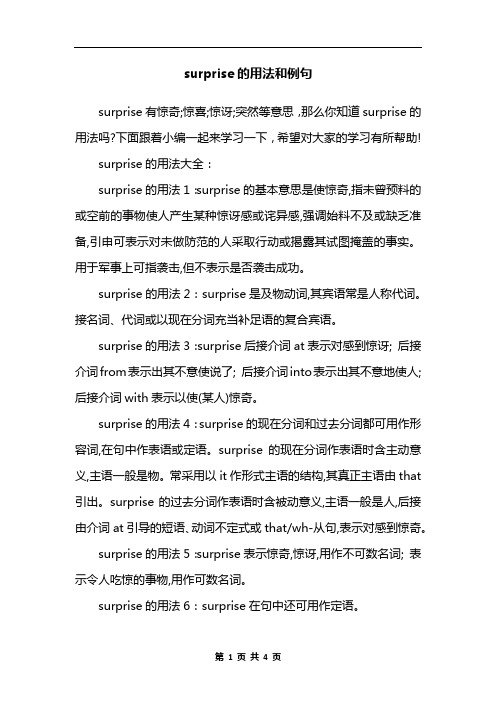surprise 的用法
surpriseed的用法

surpriseed的用法一、令人惊讶的用法介绍"Surprised"是一个常见的形容词,用于描述当人们经历或观察到某种突然和意外的事物时所感受到的情绪。
然而,“surprise”还有很多其他用法,可以作为动词、名词和副词,这些不同的用法使得它在语言交流中变得更加丰富多样。
本文将介绍“surprise”的几个常见用法并提供相关示例,以帮助读者更好地理解该词。
二、动词:“使某人感到惊讶”首先,我们来看“surprise”作为动词时的主要用法。
在这种情况下,“surprise”表示某人对于出现突发事件或意外事项感到震惊、吃惊或惊奇。
下面是一些例句:1. The unexpected guest surprised us all.(这位意外的客人让我们大家都感到惊讶。
)2. She surprised her family with a special birthday party.(她给家人准备了一场特别的生日派对,让他们感到非常吃惊。
)3. His sudden resignation surprised everyone in the office.(他突然辞职令办公室里每个人都感到非常震惊。
)三、名词:“意外的事物或情况”除了作为动词的用法之外,“surprise”也可以作为名词使用,指代意想不到的事物或情况。
下面是一些例句:1. His promotion came as a surprise to all of us.(他的晋升对我们所有人来说都是个意外。
)2. The fireworks display was a wonderful surprise for the audience.(烟花表演让观众感到惊喜。
)3. The party ended with a big surprise – a marriage proposal!(派对以一个大惊喜——求婚!——结束了。
初中生英语词汇必背 surprise用法与训练

surprisen. 惊奇,诧异;vt. 使惊奇;奇袭第三人称单数surprises过去式 surprised过去分词 surprised现在分词 surprising派生词surprisedadj. 感到惊讶的,出人意料的surprisingadj. 令人惊讶的;意外的必背清单常用搭配1.by surprise 出其不意地2.in surprise 惊奇地3.give sb a (big)surprise 给某人一个惊喜4.to one’s surprise 让某人吃惊地是5.be surprised at (doing)sth对---(做)感到吃惊6.be surprised to do sth吃惊地做某事7.be surprised that --吃惊地做某事考点提要①辨析surprised /surprisingSurprised 修辞人,主语是人,表示人的内心活动。
Surprising修饰物,表示事物的特征。
练习词性词形1.Much to our ______, Sam wasn’t ______ at the _____ news.A. surprise; surprised; surpriseB. surprise; surprised; surprisingC. surprised; surprising; surprisedD. surprising; surprised; surprise2.That was a game. We were all at it.A. surprise, surprisingB.surprising, surprisedC.surprising, surpriseD.surprise, surprise3.The story ____ me, that is, I am _____ at the ___ story.A. surprise; surprising; surprisedB.surprises; surprised; surprisedC. surprise; surprised; surprisingD. surprises; surprised; surprising参考答案:1.B 2.B 3. D综合运用1._______, 90% of the money ____ hers.A. In our surprise, isB. To our surprise, isC. To our surprises, areD. To me surprise, is2.On hearing the __ news, she was very __ and looked at me___.A. surprising, surprising, with surpriseB. surprise, surprised, with surprisedC. surprising, surprised, in surpriseD. surprised, surprise, in surprised3.She said she was having a __ party for Lily on Friday night.A. surpriseB. surprisedC. to surpriseD. surprises参考答案:1.B.2.C 3.A情景交际1.—My uncle came from London to see me last week.—A.What a surprise!B. I feel sorry for youC. What a pity! 参考答案A词组搭配1.________ our surprise, when the audience saw this film, they all shouted ______ surprise.A.In ; inB.In ; atC.To ; inD.To ; at 参考答案:C。
高考英语必背知识点 Surprise的用法

高考英语必背知识点 Surprise的用法来源:互联网高考如何复习一直都是考生们关注的话题,整理了高考英语必背知识点,希望为考生们提供服务。
下面为您解读高考复习策略。
Surpriseto one’s surprise表示“令人吃惊的是”,是介词短语。
作结果状语或插入语,位于句首,其中one’s 指形容词性物主代词或名词所有格,surprise前也可用形容词修饰。
例如:To my great surprise, he passed the English examination.令我大为吃惊的是,他的英语考试极格了。
To Mr Lin’s surprise, Miss Li alone got three gold medals.使林先生吃惊的是,李小姐一人得三块金牌。
(2)in surprise表示“吃惊地、惊奇地”,是介词短语,作程度状语,常位于谓语之后。
例如:“How do you come to know it ?”Mr Zhao asked in surprise.赵先生惊奇地问:“你怎么知道的?”He shouted to us in surprise.他吃惊地向我们呼喊。
(3)by surprise表示“出其不意、趁……不防、突然”,是介词短语,作方式状语。
例如:He took the dog by surprise. 他趁那条狗不防突然进行袭击。
His visit took me by surprise.他的突然来访使我感到意外surprised adj.感到惊奇①be surprised to do ②be surprised at③be surprised that从句They were surprised to hear the news.他们听到那个消息感到很惊讶。
He was surprised at their visit.他对他们的来访感到惊讶。
We are surprised that she can finish all these things in such a short。
surprise 的名词行用法

surprise 的名词行用法
surprise是一个名词,表示意外或惊奇的感受。
在句子中,它可以作为主语、宾语或表语。
【作主语】
Surprise is the best gift. 惊喜是最好的礼物。
The surprise was ruined when he found out. 当他发现真相时,惊喜全没了。
【作宾语】
I have a surprise for you. 我有个惊喜给你。
Her reaction was one of genuine surprise. 她的反应是真正的惊喜。
【作表语】
The look on his face was one of complete surprise. 他的表情完全是惊奇的。
The party was a complete surprise to her. 派对对她来说是完全的惊喜。
除了这些用法以外,surprise 还可以作为动词和形容词使用,表示使惊奇或意外的感受,或是描述给人带来的惊奇感。
- 1 -。
surprise的各种词性

surprise的各种词性大多数人都熟悉“surprise”一词,它是一个简单的英文单词,意思是“惊讶”,“惊奇”,“出乎意料”。
大家可能知道,surprise有许多不同的词性。
从而,本文将探讨它的各种词性和用法,以便更好地了解这个有趣的词汇。
首先,surprise的名词有两个意思:“惊讶”和“惊奇”。
它可以用来表达一个人对一个事件或行为的惊讶和惊讶。
比如:John sudden departure was a surprise to us.翰的突然离开给我们带来了惊讶。
在这个句子中,surprise表达了一种惊讶的意思,也可以换成astonishment来表达同样的意思。
此外,surprise还可以用作形容词,表示“惊讶的”,“出人意料的”,“令人惊讶的”。
比如:The surprise victory of the new president surprised everyone.总统出人意料的胜利令所有人都惊讶不已。
在这个句子中,surprise表示一种惊讶的感受,也可以换成astonishing来表达同样的意思。
此外,surprise还可以用作动词,表示“使惊讶”,“使意外”,“使惊奇”。
比如:His sudden appearance at the party surprised us. 他突然出现在派对上使我们惊讶。
在这个句子中,surprise表示一种惊讶的感受,也可以换成astonish来表达同样的意思。
最后,surprise还可以用作不及物动词,意思是“被惊讶”,“惊讶”,“惊奇”。
比如:She was surprised at the news.对这消息感到惊讶。
在这个句子中,surprise表达了一种惊讶的感受,也可以换成astound来表达同样的意思。
总的来说,surprise不仅可以用作名词,也可以用作形容词,动词和不及物动词。
在英语口语和书面表达中,它都有着广泛的用法。
surpurise的用法

surpurise的用法一、surpurise的用法解析"Surpririse" 是一个拼写错误,正确的单词应为 "Surprise"。
下面将详细解析"Surprise" 一词的用法和相关表达方式。
1. Surprise 作为名词:Surprise 在名词意义上通常表示一个突如其来的事件或情况,不同程度地使人感到惊讶或震惊。
以下是几种常见的搭配以及例句:- Pleasant surprise (令人愉快的惊喜):Receiving a gift from a friend was such a pleasant surprise.- Big surprise (大惊讶):It came as no big surprise that he won the competition.- Complete surprise (完全出乎意料):Her sudden resignation was a complete surprise to everyone.- Unpleasant surprise (令人不快的惊讶):The unexpected bill was an unpleasant surprise.2. Surprise 作为动词:Surprise 可以作为及物或不及物动词,意味着对某人进行了突袭、令其感到惊讶。
- To be surprised (感到吃惊):I was pleasantly surprised by the new design of the building.- To surprise someone (使某人吃惊):They decided to throw a party to surprise their friend on her birthday.3. Surprise 还有其他形式和表达方式:A. Surprising 形容词形式表示 "令人吃惊的"。
surprise的用法和例句

surprise的用法和例句surprise有惊奇;惊喜;惊讶;突然等意思,那么你知道surprise的用法吗?下面跟着小编一起来学习一下,希望对大家的学习有所帮助!surprise的用法大全:surprise的用法1:surprise的基本意思是使惊奇,指未曾预料的或空前的事物使人产生某种惊讶感或诧异感,强调始料不及或缺乏准备,引申可表示对未做防范的人采取行动或揭露其试图掩盖的事实。
用于军事上可指袭击,但不表示是否袭击成功。
surprise的用法2:surprise是及物动词,其宾语常是人称代词。
接名词、代词或以现在分词充当补足语的复合宾语。
surprise的用法3:surprise后接介词at表示对感到惊讶; 后接介词from表示出其不意使说了; 后接介词into表示出其不意地使人; 后接介词with表示以使(某人)惊奇。
surprise的用法4:surprise的现在分词和过去分词都可用作形容词,在句中作表语或定语。
surprise的现在分词作表语时含主动意义,主语一般是物。
常采用以it作形式主语的结构,其真正主语由that 引出。
surprise的过去分词作表语时含被动意义,主语一般是人,后接由介词at引导的短语、动词不定式或that/wh-从句,表示对感到惊奇。
surprise的用法5:surprise表示惊奇,惊讶,用作不可数名词; 表示令人吃惊的事物,用作可数名词。
surprise的用法6:surprise在句中还可用作定语。
surprise的常用短语:用作动词(v.)surprise at (v.+prep.)surprise by (v.+prep.)surprise into (v.+prep.)surprise out of (v.+adv.+prep.)surprise with (v.+prep.)用作名词(n.)(much/greatly) to ones surprisetake by surprisesurprise的用法例句:1. Sue screamed, not loudly, more in surprise than terror.休尖叫起来,声音不大,吃惊多于恐惧。
surprise的用法

surprise的用法surprise作为一个动词,有着广泛的用法。
它的定义是“使(某人)感到意外”,通常可以指令人感到惊讶、震惊、惊喜、惊奇等情绪,以及反应等。
一、 surprise作谓语动词1、示对对方感到意外surprise做谓语动词时,可以用来形容使对方感到惊讶的动作。
如:He never expected that I could surprise him with my improved English.他从未料到我的英语会有这么大的提高竟然可以惊到他。
2、示自己的意外反应当我们发现或听到一件令人惊奇的事,也可以用surprise作谓语动词。
如:I was surprised to see the result of the experiment.到实验结果,我很惊讶。
二、 surprise宾语surprise作宾语时,可以是“惊讶、震惊,惊喜或惊奇某人”。
如:She was surprised to see him at the party.惊讶地发现他出现在晚会上。
We are surprised at the news.们很惊讶这个消息三、 surprise做定语Surprise作定语时,可以指令人惊讶的事物,以及指无法预料的事情。
如:It was a surprise to learn that he had already gone to the U.S.说他已经去美国了,真是意外。
They gave us a surprise present on our wedding day.他们在我们结婚日送给了我们一份出乎意料的礼物。
四、 surprise相关短语1、 be no surprise不奇怪,也不好奇It no surprise that he failed the exam.他考试失败也不奇怪。
2、to one surprise 使某人惊讶的是To our surprise, she actually got the job.令我们意外的是,她竟然得到了这个工作。
- 1、下载文档前请自行甄别文档内容的完整性,平台不提供额外的编辑、内容补充、找答案等附加服务。
- 2、"仅部分预览"的文档,不可在线预览部分如存在完整性等问题,可反馈申请退款(可完整预览的文档不适用该条件!)。
- 3、如文档侵犯您的权益,请联系客服反馈,我们会尽快为您处理(人工客服工作时间:9:00-18:30)。
一、surprise vt.& n.使吃惊;惊奇
in surpise惊奇地
by surpise出其不意地
to one's surpise使人吃惊的是
二、surpised adj.吃惊的
be surpised to do sth.
三、surprising也是形容词,使人吃惊的(与surprised的区别是surprising对象是物体本身令人吃惊,是物体的属性)
说到surprise ,大家可要留心了。
surprise 在英语中是个常用词,而且是个兼类词,既可以作动词,还可以作名词,用法多着呢。
(1 )作及物动词的surprise ,其基本含义是“使(人)感到惊讶”,后面可以直接跟宾语。
如:
His progress surprise me.
他的进步使我感到惊讶。
( 2 )特别值得一提的是,surprise 的现在分词surprising 和过去分词surprised 都可以作形容词,只不过surprising 在句中多作定语,后面跟名词,如:
He gave me some surprising news.
他给我带来一些令人惊讶的消息。
surprising 有时也作表语,但主语多是物,如:
The result is surprising.
结果是令人惊讶的。
而surprised 在句中多作表语,后面可接不定式或从句,其主语多是人,如:
I was surprised to see him there.
我真想不到会在那儿见到他。
如果我们想把surprising 和surprised 区分开来,大家不妨记住这个句子:
We are surprised at his surprising success.
我们对他惊人的成功感到惊讶。
(3 )我们再看看surprise 作名词,其含义是“惊奇;诧异”。
需注意的是surprise 作名词时,常和不同的介词一起构成介词短语,如:in surprise, to one's surprise, 前者意为“惊讶地;吃惊地”,后者意为“使人惊讶的是……”。
两者在句中都是介词短语作状语,如:
Tom looked at me in surprise.
汤姆惊讶地望着我。
看,surprise 的用法不少吧。
熟悉了surprise 的各种用法后,你一定不会对它感到“惊讶”了吧!
surprise: vt.使吃惊;惊奇
n.惊奇
vt: surprise sb.
n: in surprise ;to one's surprise; a big surprie
词组
to one's surprise使某人惊奇的是
surprise sb.让某人感到吃惊
in surpise惊奇地侧重于主动,即主语处于吃惊的一种状态
by surpise出其不意地侧重于被动,即别人做了某事使另外一个人吃惊
be surpised to do sth.
surpised adj.吃惊的
surprising adj.使人吃惊的(与surprised的区别是surprising对象是物体本身令人吃惊,是物体的属性)。
